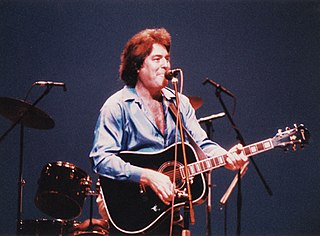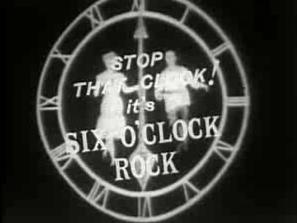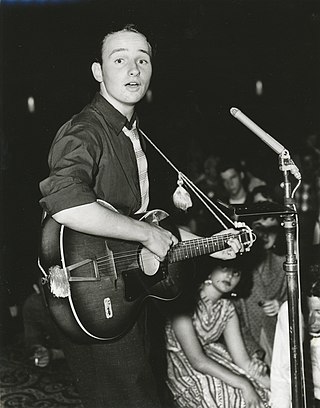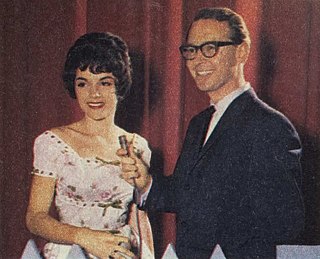Maxwell James Merritt was a New Zealand-born singer-songwriter and guitarist who was renowned as an interpreter of soul music and R&B. As leader of Max Merritt & The Meteors, his best known hits are "Slippin' Away", which reached No. 2 on the 1976 Australian singles charts, and "Hey, Western Union Man" which reached No. 13. Merritt rose to prominence in New Zealand from 1958 and relocated to Sydney, Australia, in December 1964. Merritt was acknowledged as one of the best local performers of the 1960s and 1970s and his influence did much to popularise soul music / R&B and rock in New Zealand and Australia.
The Pied Piper of Cleveland: A Day in the Life of a Famous Disc Jockey is an American musical documentary film produced in the fall of 1955 documenting the career of disc jockey Bill Randle. Arthur Cohen directed the film, which was produced by Bill Randle himself.
Leslie William Morrison, known professionally as Lucky Starr, is an Australian pioneer rock and roll, pop and country music singer, guitarist and television presenter. His most popular single, "I've Been Everywhere", appeared in early 1962, which peaked at number one in Sydney. Starr became well known through his many TV appearances on shows such as Bandstand and Six O'Clock Rock, in which he briefly hosted taking over from Johnny O'Keefe, he was the first star to entertain troops in Vietnam.

Barry John Stanton was a British-Australian rock and roll musician. He performed on pop music programs, Six O'Clock Rock, Bandstand, Johnny O'Keefe Show, Sing Sing Sing, Saturday Date, and Woody's Teen Time. He issued a compilation album, A Tribute to the King Rare Songs 1957-1965, in 1988.
Leedon Records was an Australian record label active from 1958 to 1969. It was founded by American Australian entrepreneur Lee Gordon in early 1958.
Colin Frederick Jacobsen, better known by his stage name Col Joye, is an Australian pioneer rock singer-songwriter, musician and entrepreneur with a career spanning almost sixty-seven years, starting from the late 50s. Joye was the first Australian rock and roll singer to have a number one record Australia-wide, and experienced a string of chart successes in the early Australian rock and roll scene, performing with his then band the Joy Boys.
"Wild One" or "Real Wild Child" is an Australian rock and roll song written by Johnny Greenan, Johnny O'Keefe, and Dave Owens. While most sources state that O'Keefe was directly involved in composing the song, this has been questioned by others. Sydney disc jockey Tony Withers was credited with helping to get radio airplay for the song but writer credits on subsequent versions often omit Withers, who later worked in the United Kingdom on pirate stations Radio Atlanta and, as Tony Windsor, on Radio London.

John Michael O'Keefe was an Australian rock and roll singer whose career began in the early 1950s. A pioneer of Rock music in Australia, his hits include "Wild One" (1958), "Shout!" and "She's My Baby". Often referred to by his initials "J.O'K." or by his nickname "The Wild One", O'Keefe was the first Australian rock n' roll performer to tour the United States, and the first Australian artist to make the local Top 40 charts. He had twenty-nine Top 40 hits in Australia between 1958 and 1973. In his twenty-year career, O'Keefe released over 50 singles, 50 EPs and 100 albums. O'Keefe was also a radio and television entertainer and presenter.

Six O'Clock Rock was an Australian rock and roll television show broadcast on ABC Television from 28 February 1959 to 1962 at 6 p.m. on Saturdays.

Lonnie Lee is an Australian singer, who has fronted Lonnie Lee and the Leeman and Lonnie Lee and the Leedons. He is a pioneer of Australian rockabilly music and has worked in the industry for 60 years. At the peak of his career, Lee had eight top 100 singles, which included three top 20s, "Ain't It So", "Starlight Star Bright" and "I Found a New Love" (September). He achieved five gold records. Although Lee released his last single, "Sad Over Someone" in 1969, continued to tour and perform into the 2000s and released his last album in 2019 called Back to Base X,

Bandstand is an Australian live pop music, variety television program screened from November 1958 to June 1972. Featuring both local and international music artists, and produced in-house at the studios of the Nine Network in Willoughby, New South Wales, it was originally broadcast only in New South Wales, It became a national program in the early 1960s as the network expanded into other Australian states. The host of Bandstand for its entire existence was radio presenter and television newsreader Brian Henderson.

Lee Gordon was an American entrepreneur and rock and roll promoter who worked extensively in Australia in the late 1950s and early 1960s. Gordon's jazz and rock 'n' roll tours had a major impact on the Australian music scene and he also played a significant role in the early career of pioneering Australian rock'n'roll singer Johnny O'Keefe, serving as his manager.

Christ Church, Lavender Bay is an Anglican church in the Sydney suburb of Lavender Bay, New South Wales, Australia, just north of the Sydney Harbour Bridge. The church is listed on the Register of the National Estate.

The Delltones were an Australian rock 'n' roll band, which formed in 1958. They started as a doo-wop, harmony quartet with Warren Lucas, Brian Perkins, Noel Widerberg and Ian "Peewee" Wilson. In July 1962 Noel Widerberg died in a car accident in Brighton-le-Sands in Sydney, and three weeks later the group's single, "Get a Little Dirt on Your Hands", reached the top five on the local charts. Widerberg's position was filled by Col Loughnan. The group disbanded in 1973.
Johnny Rebb, born Donald James Delbridge, was an Australian singer.
Lee Robinson was an Australian producer, director and screenwriter who was Australia's most prolific filmmaker of the 1950s and part of the creative team that produced the late 1960s international hit television series Skippy the Bush Kangaroo.
Lorraine May Chapman, professionally known as Laurel Lea, was an Australian popular singer of the late 1950s and early 1960s. Lea appeared regularly on TV series, Bandstand, Six O'Clock Rock and Saturday Date. In 1974 and 1975 she toured throughout Australia with contemporaries Johnny O'Keefe, Johnny Devlin, Lonnie Lee and Barry Stanton. On 31 January 1992 Lea died of leukaemia.

The Crescents were a vocal harmony group which formed in Sydney, Australia in late 1958 under the name The 4 Tops. The Crescents were best known for their Top 10 hit "Mr. Blue" and for their tours with Lee Gordon's "Big Shows" supporting Johnnie Ray, Fabian, and Ricky Nelson.

Colin John Loughnan is an Australian jazz saxophonist, teacher, and composer, best known as a member of the Delltones, Ayers Rock, Judy Bailey quartet, and as a teacher of saxophone at the Sydney Conservatorium of Music. Although Loughnan has long been associated with jazz music, the first nine years of his career were spent as a non-instrumental vocalist with vocal harmony groups The Crescents, and The Delltones starting in 1958. In the 60s, he learnt to play the saxophone, performing as an instrumentalist with Col Nolan and The Soul Syndicate, and as a founding member of the Daly-Wilson Big Band. At this time Loughnan was proficient in saxophones, flutes, and clarinet.
Digger Revell and the Denvermen were an Australian rock 'n' roll and instrumental surf band, which formed in 1961. Lead singer Digger Revell was joined by the Denvermen, Phil Bower on drums, Allan Crowe on bass guitar, Les Green on lead guitar and Tex Ihasz on rhythm guitar. They had top 40 hits on the Kent Music Report singles chart with "Surfside", "Blue Mountains", "Avalon Stomp" and "My Little Rocker's Turned Surfie" (1964). The group disbanded in 1965 and Revell had a solo career.













